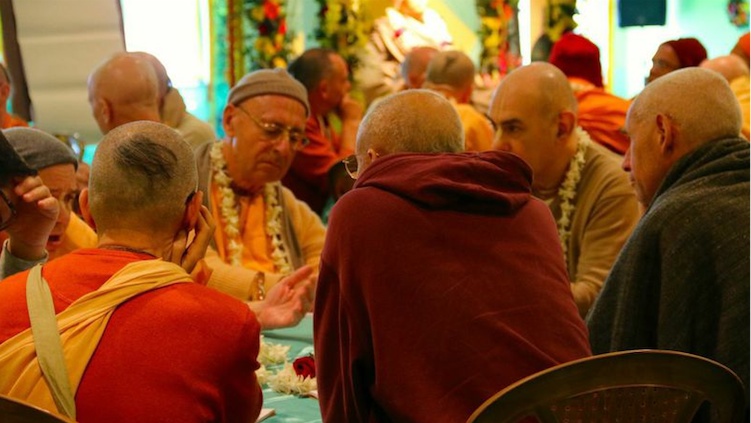Mayapur Sanga of ISKCON Sannyasis, Gurus and GBCs – Day One
By GBC Community Relations Office of the Strategic Planning Network | Фев 06, 2015

Today saw the start of the much-anticipated Sanga of Sannyasis, Gurus and GBCs, (SGGS). Over eighty of ISKCON’s most senior leaders and preachers from across the globe gathered in Sri Dhama Mayapur for three days of association, contemplation, and in-depth discussion in response to Srila Prabhupada’s directive to find unity in diversity.
Leaders representing India, Africa, Russia, Europe, and the Americas were present, making it truly an international gathering.
Facilitated by a member of the Strategic Planning Team (SPT) the day began with devotees sharing in groups stories of what they have witnessed other devotee’s doing over the past two years that has inspired them. This proved to be an uplifting session where, among others, examples were given of unknown or unsung devotees performing incredible feats in the service of Srila Prabhupada and ISKCON.
The format of the three days was explained, where as a group, we would explore our past, present, and future. We were reminded that according to our Vedic tradition time is cyclical, and it is within our tradition to want to look at the past because the past has a tendency to repeat and impact the present. "Шримад-Бхагаватам" is replete with past times that offer valuable lessons for the present by observing the past.

Participants were invited to look back and write down their most important remembrances from the past five decades, dividing them into three categories: 1) society (as in, the wider world); 2) ISKCON; 3) personal. Devotees were then asked to post these remembrances on a papered wall. This proved a very interesting and illuminating exercise that spoke volumes. Devotees had so much to write that the thirty foot space on the wall wasn’t sufficient.
On having the opportunity to read the many remembrances, a devotee spoke of how he was struck by “how many challenges we had faced – many we didn’t anticipate and yet we survived them”! He cautioned that “we need to remain vigilant, careful to make fewer mistakes, as mistakes, large or small, have consequences.”
Another observed that whatever is going on in the wider world has an impact on ISKCON. “We need to step back, see what patterns emerge when we look at our past, and as leaders be vigilant and intelligently take care of the issues brought to light.”

In general, the participants feel ISKCON is more organized now than it was in the past, and they unanimously agreed that the most significant trend is how apparent Srila Prabhupada’s mercy has been throughout the last five decades.
After an energetic and enthusiastic few hours, the morning session successfully concluded.
After lunch, the facilitator led the group into a discussion and analysis of the trends the morning had identified, recognizing that the trends within ISKCON and in the world around it have had an impact on its outreach and growth. Devotees formulated their thoughts and wrote them onto another papered wall.

Reading the observations, participants voiced concern, among other things, on the trend they were seeing on diminishing standards in the movement as they continue to move from a temple-centric to congregation-based movement. For example, although ISKCON has strong programs for teaching the sastra (scriptures), more could be done to guide people in the practicalities of living a Vaishnava life, as Srila Prabhupada trained his disciples. It was also noted that trends in the wider world have both positive and negative effects for ISKCON, and that these trends could be perceived differently in different parts of the world, which have differing cultural influences.
The afternoon discussion was energetic and laid the foundation for stimulating discussions for the days ahead. Based on feedback from many of the participants, the day was a great success, and as several senior devotees pointed out, a manifestation of Srila Prabhupada’s instruction that ISKCON’s senior leaders come together every year in Mayapur to discuss how to serve ISKCON with the spirit of unity in diversity.















